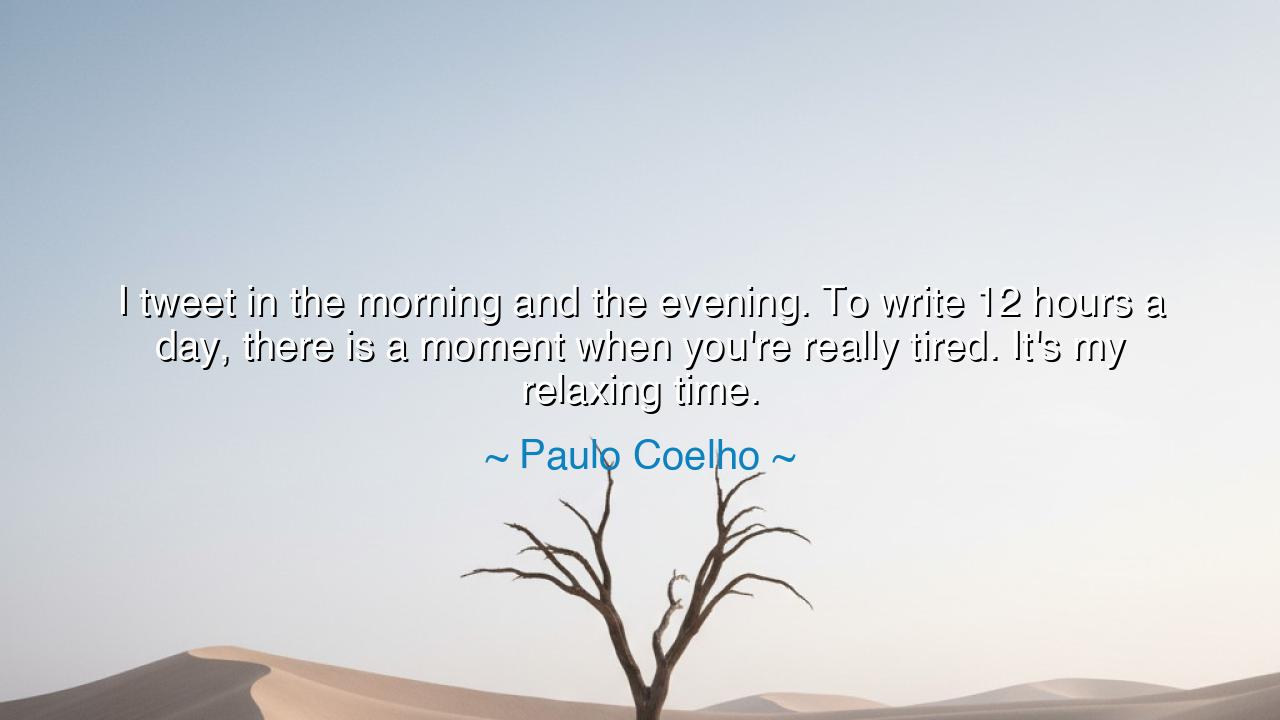
I tweet in the morning and the evening. To write 12 hours a day
I tweet in the morning and the evening. To write 12 hours a day, there is a moment when you're really tired. It's my relaxing time.






The words of Paulo Coelho, “I tweet in the morning and the evening. To write 12 hours a day, there is a moment when you’re really tired. It’s my relaxing time,” speak to the balance between discipline and renewal, between creation and repose. Here, one of the great storytellers of our age confesses that even the most devoted craftsman cannot burn the lamp endlessly. To labor at writing for twelve hours demands immense focus, yet he reveals that rest is not always silence or sleep—it can also be the lightness of expression, a brief turning aside to something simple, playful, and human.
The origin of these words lies in Coelho’s own life as a man of letters. Known for works such as The Alchemist, he is one who has spent countless hours shaping words into wisdom. Yet even he, who is so immersed in the sacred act of writing, acknowledges the weariness that comes from too much intensity. For him, the act of tweeting—sending small thoughts out into the world—becomes a release, a breathing out after long hours of inward labor. It is a reminder that even the deepest well must sometimes overflow in small streams to remain fresh.
History has shown us this balance before. The philosopher Aristotle taught that the soul requires both energeia (vigorous action) and scholē (leisure). Without labor, nothing is built; without leisure, nothing is sustained. Even the greatest minds recognized that unbroken toil leads to collapse. Leonardo da Vinci, in his notebooks, advised that one must step away from one’s work, for in rest the mind reorganizes itself and inspiration returns renewed. Coelho’s practice of lighthearted writing amidst the weight of his craft follows this ancient wisdom.
We may also look to the life of Marcus Aurelius, emperor and philosopher. Amid the burdens of ruling Rome, he would pause each morning and evening to write in his Meditations. These notes were not for the Senate or for history, but for himself—small reflections that brought peace to his spirit and order to his thoughts. Just as Coelho uses social media to lighten his heart, Marcus used his journal to restore his soul in the midst of great responsibility. Both remind us that great labor must be balanced with quiet acts of renewal.
The lesson is this: unbroken effort without rest leads not to greatness but to exhaustion. True wisdom is knowing when to pause, when to refresh the spirit, when to step aside from the monumental task to engage in something smaller, simpler, and free of burden. Coelho’s tweets are not distractions, but anchors—small rituals of restoration that allow him to return to his deeper writing with clarity. Each of us, no matter our calling, must learn this balance if we are to endure in our work.
Practically, this means creating small rituals of release in our own lives. If your labor is heavy, find moments of lightness. If your day is filled with responsibility, carve out time for joy, play, or simple expression. These moments need not be grand; they may be a walk, a short prayer, a sketch, or even a few words shared with the world. Such acts protect the mind from weariness and keep the fire of inspiration alive.
So, beloved listener, take Coelho’s confession as a guide. Work with passion, but rest with intention. Create with all your strength, but allow yourself moments of play. For life is not a single unbroken effort, but a rhythm of exertion and renewal, of silence and expression. Follow this rhythm, and your labors will not consume you, but will instead carry you, steady and strong, toward the fullness of your destiny.






AAdministratorAdministrator
Welcome, honored guests. Please leave a comment, we will respond soon